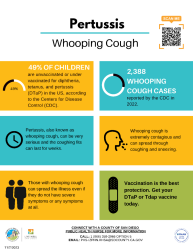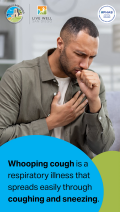Whooping Cough (Pertussis)
Page last updated 11/24/2025.
In alignment with leading medical, health, and patient advocacy groups, the County of San Diego affirms that vaccines are not linked to autism. We remain committed to ensuring residents continue to have access to safe and effective vaccines that are based on credible, transparent, and science-based evidence.

Whooping cough, or Pertussis, is a respiratory illness caused by a bacteria called Bordetella pertussis. Whooping cough is known for the “whoop” noise when someone gasps for air after a coughing fit. Whooping cough can cause serious illness in people of all ages but is most dangerous for babies.
On this page:

Babies younger than 1 year old and people with pre-existing health conditions are at greatest risk for getting a serious case of whooping cough.
The best way to prevent whooping cough is to get vaccinated. There are 2 types of vaccines that protect against whooping cough: DTaP and Tdap.
- These vaccines also provide protection against tetanus and diphtheria.
- These vaccines cannot give you pertussis, tetanus, or diphtheria.
- The Centers for Disease Control and Prevention (CDC) recommends vaccination for everyone, including: babies and children, preteens and teens, people who are pregnant, and adults.
Practicing good hygiene can also prevent the spread of respiratory illnesses.
- Cover your cough or sneeze.
- Wash your hands with soap and water often.
The bacteria that causes whooping cough spreads easily from person-to-person through the air. This can happen when:
- A person who has whooping cough sneezes or coughs.
- People spend a lot of time together or share breathing space, like when you hold a newborn on your chest.
People can be contagious for weeks and can spread the bacteria:
- From the start of the very first symptoms and for at least 2 weeks after coughing begins.
- Even if they have mild symptoms or don’t know they have whooping cough. Many babies who get whooping cough are infected by older siblings, parents, or caregivers who do not know they have it.
It usually takes 5-10 days for symptoms to appear after exposure to the bacteria that cause whooping cough. Sometimes symptoms don’t develop for up to 3 weeks.
Whooping cough may begin like a common cold. Early symptoms can last for 1 to 2 weeks and usually include:
- Runny or stuffed-up nose;
- Low-grade fever (less than 100.4°F); and
- Mild, occasional cough.
- Babies may struggle to breathe. Many babies with whooping cough don’t cough at all. Instead, they may have apnea (life-threatening pauses in breathing). The apnea may cause cyanosis (to turn blue), or they may struggle to breathe.
One to 2 weeks after the first symptoms start, people may develop coughing fits (paroxysms). These coughing fits usually last 1 to 6 weeks but can last up to 10 weeks. The cough generally gets worse and becomes more common as the illness continues.
Coughing fits can cause people to:
- Make a high-pitched “whoop” sound when they are finally able to breathe at the end of a coughing fit;
- Vomit during or after coughing fits;
- Feel very tired after the fit, but usually seem well in-between fits;
- Have trouble sleeping at night;
- Struggle to breathe; and/or
- Fracture (break) a rib.
Recovery from whooping cough can be slow. The cough becomes milder and less common over time. Coughing fits may stop for a while but can return if you get other respiratory infections.
Whooping cough can be hard to diagnose because the signs and symptoms are similar to other respiratory illnesses. It can be helpful to know if you've been in contact with someone who has whooping cough.
Doctors diagnose whooping cough by doing a:
- History of typical signs and symptoms,
- Physical exam,
- Laboratory test of a mucus sample from the back of the throat, and
- Blood test.
It is very important to treat whooping cough early, before coughing fits begin. Doctors generally treat whooping cough with antibiotics. Further treatment in the hospital may be required if symptoms are serious.
County of San Diego
- County Public Health Reports Increase in Whooping Cough Cases (County News Center, November 14, 2024)
- Information for Parents and Schools
California Department of Public Health (CDPH)
Centers for Disease Control and Prevention (CDC)
For Healthcare Professionals
County of San Diego
-
CAHAN San Diego Alerts
- Health Advisory: Pertussis Increasing in San Diego County (November 14, 2024)
- Health Advisory: Pertussis Increasing in San Diego County (November 22, 2023)
- Pertussis Guide for Health Care Professional (Flyer)
CDPH
- Pertussis Quicksheet (PDF)
- Pertussis Clinical Guidance
- B. Parapertussis Infection: Public Health Recommendations (PDF)
CDC
Call the Epidemiology Unit at (619) 692-8499, or send an e-mail, for more information.








